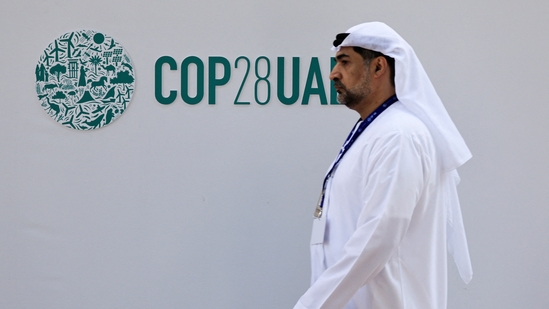COP28: Impact of the climate crisis on public health
This article is authored by Ananya Raj Kakoti and Gunwant Singh, scholar, international relations, Jawaharlal Nehru University, New Delhi.
The coming together of global health and climate action at COP28 marked a watershed moment in the ongoing battle against climate crisis's profound impacts on public health. Two fundamental storylines emerged: the increasingly dire health risks triggered by the changing climate and the ground-breaking 'COP28 UAE Declaration on Climate and Health.' This pivotal juncture not only acknowledged the gravity of climate-induced health crises but also heralded a crucial shift towards proactive measures and collaborative solutions.

It was a defining moment where the world collectively recognised the urgent necessity to confront and address the intricate interplay between climate crisis and human health. The union of these narratives underscored the imperative to take immediate action, instigating a paradigm shift in how we approach the profound challenges posed by climate-driven health threats.
This union wasn't just symbolic; it represented a clarion call for actionable initiatives, an urgent plea to fortify global efforts, and an acknowledgement of the need for cohesive strategies. It served as a recognition that protecting public health in the face of climate crisis requires comprehensive, proactive, and collaborative responses.
The spectre of climate-induced health hazards looms large, casting a shadow of imminent danger as projections reveal a dire surge in mortality rates. By 2030, a staggering upsurge of 250,000 annual deaths is anticipated, attributed to the compounding effects of malnutrition, malaria, dengue, diarrhoea, and heat stress—an ominous forecast issued by the World Health Organization (WHO). This escalation isn't a solitary phenomenon; rather, it's propelled by the proliferation of vector-borne diseases. Shifting temperature gradients and irregular rainfall patterns act as catalysts, unleashing an unprecedented spread of debilitating illnesses such as dengue, malaria, and zika. The repercussions are profound, triggering outbreaks in regions hitherto unaffected, and upending the health landscape in unexpected ways.
A resurgence of once-contained water-borne diseases, reignited by the tumultuous climate, paints a bleak global picture. Cholera, a harbinger of devastation, has resurged exponentially across 44 countries in 2022, marking a 25% surge in reported cases accompanied by heightened fatality rates. This revival isn't limited to a single disease; rather, erratic rainfall patterns amplify the risks of diarrhoeal diseases, disproportionately affecting vulnerable children under the age of 5. Shockingly, these diarrhoeal diseases claim the lives of over half a million young people annually, underscoring the devastating toll exacted by climate-induced health crises.
The relentless march of rising temperatures, an inescapable outcome of our changing climate, portends widespread heat stress with dire consequences for millions across the globe. Disturbing projections paint a grim picture, anticipating a quadrupling of heat-related deaths with every incremental 2-degree Celsius increase—a chilling prognosis highlighting the urgency of action. Simultaneously, the intensification of wildfires, fuelled by desiccated forests, exacerbates an already grim scenario by perpetuating hazardous air pollution. Over 2 billion people, ensnared by the choking tendrils of this pollution, grapple annually with its deleterious effects, underscoring the omnipresent threat posed by climate-driven health hazards.
The unveiling of the 'COP28 UAE Declaration on Climate and Health' stands as an epochal moment in the annals of global cooperation, drawing support from a staggering 123 countries and key organisations worldwide. This momentous declaration doesn't merely exist as symbolic rhetoric; rather, it emerges as a clarion call, a rallying cry to fortify and fortify health care systems worldwide. What amplifies its resonance and potential for transformative change is the resounding backing of substantial financial commitments from influential global institutions. This backing solidifies the declaration's efficacy in steering concrete, measurable change in the realm of climate-induced health crises.
A profound metamorphosis in governance and policy-making surfaces as health ministers converge within the UN climate conference, marking a watershed moment in the approach towards combating climate-induced health challenges. This amalgamation is emblematic of an evolving, holistic approach—one that recognises the intrinsic interconnectedness between health and environmental policies. The declaration's narrative pivots towards fostering cross-sectoral collaboration, steering efforts towards the creation of climate-resilient health systems, and unlocking enhanced financing mechanisms tailored to address the intricate nexus of climate and health.
As COP28 charts its course forward, the imperative for immediate, resolute action reverberates with increased urgency. The inclusive convening of a climate and health ministerial underscores an unwavering commitment, transcending boundaries to cultivate partnerships among global health financiers, development banks, philanthropic entities, and the private sector. This amalgamation of diverse stakeholders aligns with a singular purpose: to prioritise country-specific health agendas, scale up targeted interventions, and fortify initiatives aimed at safeguarding and promoting human health on a global scale.
These concerted efforts exemplify collaborative resilience—a collective endeavour that transcends individual interests, forging a path towards a healthier, more resilient future for humanity amidst the encroaching challenges posed by climate-induced health crises.
The coalescence of climate crisis and public health discussions at COP28 signifies a pivotal moment in acknowledging and addressing multifaceted global challenges. This convergence doesn't merely highlight the gravity of intersecting crises; it serves as a rallying point for coordinated, collective action. At its core lies the cornerstone of progress—the COP28 UAE Declaration—a testament to the collective commitment to fortify healthcare systems, shield vulnerable communities, and chart a course towards a more resilient world.
The narrative stemming from COP28 isn't one of resignation but resilience—a testament to humanity's determination and collective spirit. This collaborative endeavour, rooted in global solidarity, is a beacon of hope, illuminating the path towards a healthier, sustainable future for all. As the reverberations of COP28 traverse the globe, they echo a resounding call: Resilience demands unity, determination, and unwavering commitment.
This article is authored by Ananya Raj Kakoti and Gunwant Singh, scholar, international relations, Jawaharlal Nehru University, New Delhi.
All Access.
One Subscription.
Get 360° coverage—from daily headlines
to 100 year archives.



HT App & Website







